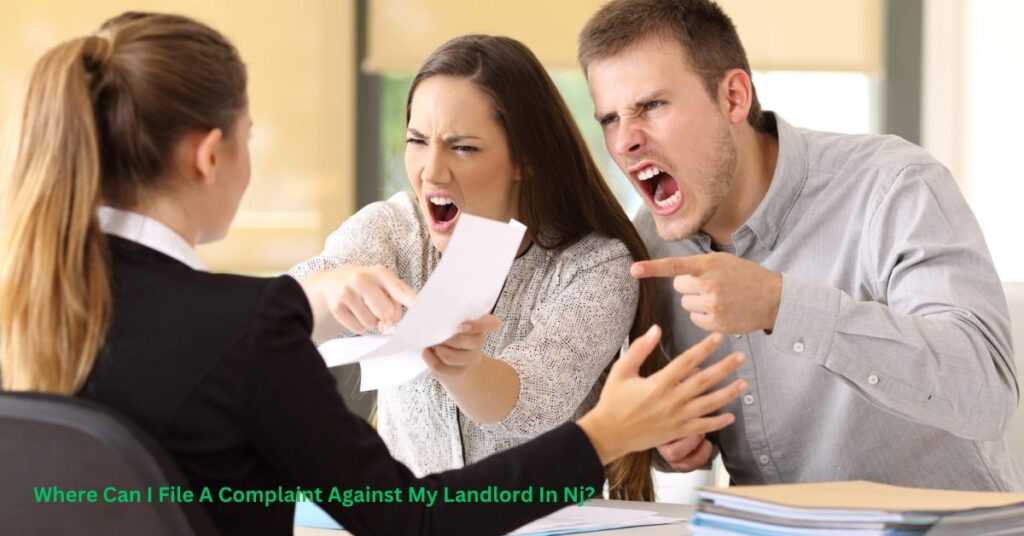If you’re renting a place in New Jersey and facing issues with your landlord, you might wonder, “Where can I file a complaint against my landlord in NJ?” It’s essential to know your rights as a tenant and where to turn for help if problems arise.
In New Jersey, tenants can file complaints against their landlords through the Department of Community Affairs (DCA) or the local housing authority. These agencies are equipped to address various issues, including maintenance problems, safety concerns, and unfair treatment.
Remember, your living situation should be safe and fair. If you encounter difficulties with your landlord, don’t hesitate to reach out to the appropriate authorities for assistance and resolution. Your well-being matters, and there are resources available to support you in protecting your rights as a tenant in New Jersey.
Overview Of Landlord Complaint Process In Nj
In New Jersey, if you’re dealing with a problematic landlord, you’re not alone. Here’s a quick overview of the process for filing a complaint. First, identify the issue whether it’s about repairs, safety, or unfair treatment. Then, gather any evidence or documentation to support your case.
Next, reach out to the Department of Community Affairs (DCA) or your local housing authority to file a formal complaint. Be clear and concise about your concerns.
After submitting your complaint, the DCA or housing authority will investigate and take appropriate action to resolve the issue. Stay informed about the progress and follow up if necessary.
Understanding Tenant Rights And Landlord Responsibilities

Tenants and landlords each have rights and responsibilities outlined by law to ensure fair and lawful rental agreements. Here’s what you need to know:
Tenant Rights:
- Right to a Safe and Habitable Dwelling: Landlords must provide a safe and habitable living space, free from hazards that could endanger health or safety.
- Right to Privacy: Tenants have the right to privacy in their rented space. Landlords must provide advance notice before entering the property, except in cases of emergency.
- Right to Repairs: Landlords are responsible for maintaining the property in good repair, including essential services such as heating, plumbing, and electricity.
- Right to Non-Discrimination: It is illegal for landlords to discriminate against tenants based on race, religion, gender, familial status, disability, or other protected characteristics.
- Right to Quiet Enjoyment: Tenants have the right to peacefully enjoy their rented space without interference from the landlord.
Landlord Responsibilities:
- Providing a Safe and Clean Environment: Landlords must ensure that the property meets health and safety standards, including proper maintenance and cleanliness.
- Respecting Tenant Privacy: Landlords should give reasonable notice before entering the rental unit, except in emergencies or specific circumstances outlined in the lease agreement.
- Handling Security Deposits Properly: Landlords must handle security deposits according to state law, including returning the deposit within a specified timeframe and providing an itemized list of deductions, if any.
- Maintaining Essential Services: Landlords are responsible for providing and maintaining essential services such as heating, hot water, and electricity.
- Abiding by Anti-Discrimination Laws: Landlords must adhere to fair housing laws and not discriminate against tenants based on protected characteristics.
Additional Considerations:
- Lease Agreements: Both parties should thoroughly review and understand the terms of the lease agreement before signing.
- Communication: Open and respectful communication between tenants and landlords can help prevent misunderstandings and resolve issues more effectively.
- Legal Recourse: If a landlord fails to uphold their responsibilities or violates tenant rights, tenants may have legal recourse through local housing authorities or small claims court.
By understanding their rights and responsibilities, both tenants and landlords can foster a positive and mutually beneficial rental relationship.
Important Considerations Before Filing A Complaint

Before filing a complaint against your landlord in New Jersey, consider gathering evidence, such as photographs or communication records, to support your case. Review your lease agreement for any clauses related to dispute resolution.
Attempt to resolve the issue directly with your landlord first, if possible. Understand the process and potential outcomes of filing a complaint with the Department of Community Affairs (DCA) or the local housing authority. Be prepared to provide specific details and documentation when submitting your complaint. Finally, prioritize your safety and well-being throughout the process.
Consider these important factors:
- Review Your Lease: Ensure you understand your lease agreement and any rights or responsibilities outlined within it.
- Document Issues: Keep records of any communication with your landlord, including emails, letters, or photos documenting problems.
- Seek Resolution: Attempt to resolve the issue directly with your landlord before escalating the matter to a formal complaint.
- Know Your Rights: Familiarize yourself with tenant rights in New Jersey to understand what constitutes a valid complaint.
- Consider Consequences: Understand that filing a complaint may strain your relationship with your landlord and could potentially lead to legal action.
It’s essential to approach the complaint process thoughtfully, weighing the potential outcomes and considering alternative solutions where possible.
Filing A Complaint With Government Agencies
Before filing a complaint against your landlord in New Jersey, it’s essential to understand the process and ensure you’re well-prepared. First, gather evidence to support your complaint, such as photos, emails, or letters documenting the issues you’ve encountered.
Review your lease agreement to understand your rights and any dispute resolution procedures outlined. Attempt to resolve the issue directly with your landlord before involving government agencies, as many problems can be resolved through open communication. However, if your attempts are unsuccessful or you feel unsafe, filing a complaint with government agencies is a viable option to address your concerns.
Here’s a breakdown of important considerations and steps to take when filing a complaint with government agencies:
- Documentation: Gather evidence to support your complaint, including photos, correspondence, rental agreements, and any relevant documentation.
- Contact Information: Obtain contact information for the Department of Community Affairs (DCA) or the local housing authority responsible for handling landlord-tenant disputes in your area.
- File the Complaint: Follow the specific procedures outlined by the DCA or housing authority to file your complaint. This may involve submitting forms online, via mail, or in person.
- Provide Details: Be thorough when explaining the nature of your complaint, providing specific details, dates, and examples to support your case.
- Stay Informed: Keep track of your complaint’s progress and any communication from the DCA or housing authority. Follow up if necessary to ensure your concerns are being addressed.
- Cooperate with Investigations: If an investigation is launched, cooperate fully with the DCA or housing authority, providing any additional information or evidence they may request.
- Understand Your Rights: Familiarize yourself with your rights as a tenant under New Jersey law, including protections against retaliation for filing a complaint.
Contacting New Jersey Department Of Community Affairs

If you’re facing issues with your landlord in New Jersey, reaching out to the Department of Community Affairs (DCA) can provide assistance. Here’s what you need to know:
Contacting the New Jersey Department of Community Affairs (DCA) is a step towards resolving problems with your landlord. Begin by gathering information about the issue you’re experiencing, like maintenance concerns, safety hazards, or unfair treatment. Then, prepare any evidence you have, such as photos, emails, or lease agreements.
You can reach out to the DCA through their website or by phone, and they’ll guide you through the complaint process. When contacting them, be clear and concise about your situation, providing details and documentation to support your case. After filing your complaint, the DCA will investigate the matter and work towards a resolution.
Stay informed about the progress of your complaint and follow up if needed. Remember, the DCA is there to help ensure fair and safe housing for all residents of New Jersey. Don’t hesitate to reach out for assistance if you’re facing difficulties with your landlord.
Filing A Complaint With Local Health Department
If you’re facing issues with your rental property that affect your health or safety, you can file a complaint with your local health department. Here’s what you need to know:
- Identify the problem: Whether it’s mold, pests, or other health hazards, document the issue with photos or notes.
- Contact your local health department: Look up their contact information online or in the phone book.
- File a complaint: Provide details about the problem and any evidence you have.
- Investigation: The health department will investigate your complaint and may take action to address the issue.
- Follow up: Stay in touch with the health department to check on the progress of your complaint.
Remember, your health and safety are important, and the local health department is there to help ensure that your rental property meets health and safety standards.
Also Read More……https://businessquasar.com/can-my-upstairs-neighbor-hear-me-talking-find-out/
Alternative Steps To Resolve Landlord Issues
If you’re having problems with your landlord in New Jersey, there are other steps to try before filing a formal complaint. Start by talking directly to your landlord about the issue, and try to work out a solution together.
If that doesn’t work, consider seeking help from a mediator or a tenant advocacy organization. They can assist in facilitating communication and resolving disputes. Remember to keep records of all communications and actions taken. By exploring alternative steps first, you may be able to resolve the issue more quickly and amicably.
Mediation And Arbitration Services In Nj
In New Jersey, mediation and arbitration services offer alternative ways to resolve disputes between tenants and landlords. Mediation involves a neutral third party helping both sides reach a mutual agreement. It’s like having a referee in a game who helps players find a fair solution. This process encourages communication and compromise, aiming for a win-win outcome.
On the other hand, arbitration involves a neutral person making a decision after hearing both sides. It’s like having a judge who listens to arguments and then decides what’s fair. While mediation is voluntary, arbitration may be mandatory if specified in your lease agreement. Both methods can save time and money compared to going to court.
They provide a less formal and more collaborative approach to resolving conflicts. If you’re facing issues with your landlord in New Jersey, consider exploring these services to find a peaceful resolution.
Remember, reaching a compromise through mediation or receiving a fair decision through arbitration can help maintain a positive landlord-tenant relationship and ensure your rights are upheld.
Consulting A Lawyer For Legal Advice
If you’re facing serious issues with your landlord in New Jersey and need guidance, consulting a lawyer for legal advice can be a wise step. A lawyer specialized in tenant rights can help you understand your legal options and rights as a tenant. They can review your lease agreement, assess the situation, and provide personalized advice tailored to your circumstances.
From dealing with maintenance problems to addressing eviction threats, a lawyer can advocate for you and help navigate the complexities of landlord-tenant laws. They can also represent you in negotiations or legal proceedings if necessary, ensuring that your rights are protected.
While consulting a lawyer may involve some cost, it can ultimately save you time, stress, and potentially money by preventing or resolving disputes effectively. Don’t hesitate to reach out for legal support if you’re unsure about your rights or facing difficult situations with your landlord. Your well-being and rights as a tenant matter, and a lawyer can help you assert them confidently.
Frequently Asked Questions For Where Can I File A Complaint Against My Landlord In Nj?
What a landlord Cannot do in New Jersey?
In New Jersey, landlords cannot discriminate against tenants based on protected characteristics, such as race, gender, or disability. Additionally, they cannot retaliate against tenants for exercising their legal rights, like requesting repairs or filing complaints.
How do I sue my landlord in NJ?
To sue your landlord in NJ, consult a lawyer specializing in landlord-tenant disputes and file a lawsuit in the appropriate court.
How do I report a landlord in NJ?
To report a landlord in NJ, contact the Department of Community Affairs (DCA) or your local housing authority. Provide details of the issue and any evidence you have. They will investigate and take appropriate action to address the problem.
What is landlord harassment in NJ?
Landlord harassment in NJ refers to actions by a landlord intended to intimidate, pressure, or retaliate against tenants, such as illegal evictions, threats, or refusal to make necessary repairs.
Conclusion
In conclusion, if you’re experiencing issues with your landlord in New Jersey, remember that you have options for seeking assistance and resolution. Filing a complaint against your landlord can be done through government agencies like the Department of Community Affairs (DCA) or your local housing authority.
By documenting your concerns, understanding your rights, and following the appropriate procedures, you can take steps to address maintenance problems, safety concerns, or unfair treatment. These agencies are there to help ensure fair and safe housing for all tenants, so don’t hesitate to reach out if you need assistance. Your well-being matters, and there are resources available to support you in asserting your rights as a tenant in New Jersey.







